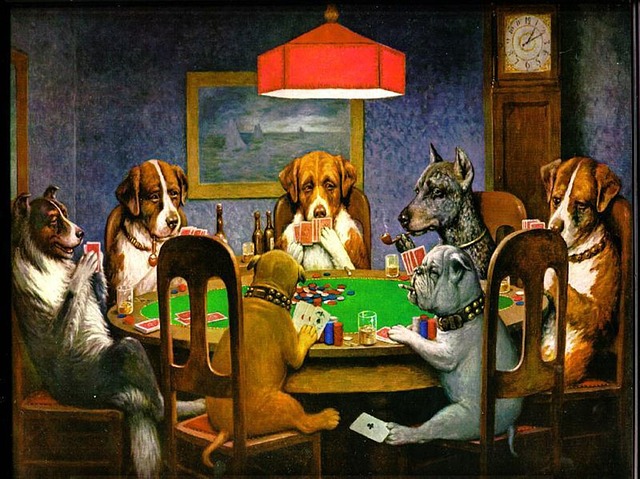
Poker Tells and Insults
When the subject of masculine games comes up, inevitably you’ll hear examples such as football, rugby, baseball, soccer, and even poker. Whereas the 1st four are physical, the last one, poker, is more intellectual. If you want to play physical games at a high level, you need to practice physical activities and develop the body. If you want to play high-level poker, you better practice your intellect, and knowledge of probability and odds. Poker also has another element: emotional intelligence, or simply EQ.
The game of poker should be well known to most men. Apparently, it’s even considered a sport nowadays, since the World Series of Poker is televised on ESPN. Poker is not just a card game, but also a game of emotional mastery and self-awareness. If you are not acutely aware of your body language, you will expose the degree of confidence you have in your cards. This is a called a “poker tell”, an external clue into your thoughts. Poker tell has been applied to many other situations in life.
There are many forms of poker tells, but I want to look at some verbal poker tells, clues into a man’s psyche. You see, it’s not just visual body language, but the choice of spoken and written language that provides a poker tell into a guy’s frame of mind and his psyche. In his post, I want to look at the use of insults as poker tells.
Insults have been hurled back and forth since the dawn of language. Some insults are as clumsy as hurling a big rock at your opponent; it’s pretty easy to see it coming and just step aside. Other insults can be more pointed, as in throwing a dart at a dartboard. Throwing a dart has an implicit assumption that the dartboard will receive and hold the dart. If the dart doesn’t stick, it doesn’t score. Insults are similar. Although an insult can be thrown at someone, it does no good if the other person doesn’t accept the insult. That’s right, insults need to be accepted to be effective. This gives rise to the child’s retort:
It’s hard to believe that children could be so insightful and understand that the insult says more about the person making the insult, than the intended victim.
In order to understand how an insult reflects on the originator, we need to first look at the nature of insults. You would have to be pretty stupid to not want to look at this. This previous sentence is, itself, an example of an insult, since I implied you would be stupid for not reading further.
The nature of an insult is to force a derogatory characteristic past a person’s boundaries in order to commit an act of emotional violence upon them, specifically to shame them. Stupidity is a generally a universal derogatory characteristic. Being stupid is always a bad state of being. Calling someone stupid is an attempt to shame them, and the person throwing the insult dart must consider the characteristic to be bad. The flinger must really dislike, even hate the characteristic used to shame the other person. It can’t be any other way.
Imagine if you called a person smart, intelligent, or wealthy. You couldn’t insult someone by throwing a good characteristic at them. Also, an insult would fail if the insulting characteristic were neutral, like American, Brazilian, magenta, aquatic, or healthy. The exception would be if the insulting characteristic had a hidden or localized meaning. For example, calling someone an American might be an insult in the Middle East.
If you think about it, how you use insults is a poker tell into your prejudices, and into your psyche. You tend to reveal your prejudices, disgust or even hatred by how you insult other people. “Fat, lazy, slob” is a poker tell that the insulter finds these characteristics disgusting. Calling somebody a “retard” exposes your contempt for people with mental incapacities.
So ask yourself, “what do I use as insults?” If you wanted to pierce somebody with a verbal dart, what would you say to them, or about them, to inflict emotional distress? That indicates both to you and to other person what you hate. Now ask yourself, “Am I OK with that?” Do you really hate that characteristic? Do you really find that ethnic group so despicable?
You might feel your opinion behind your insult is justified. You might instead be surprised at what you dislike or even hate. Understanding and dealing with your hidden prejudices is an important step in developing your emotional intelligence and being a better social human being. You can start by analyzing your own poker tells.

